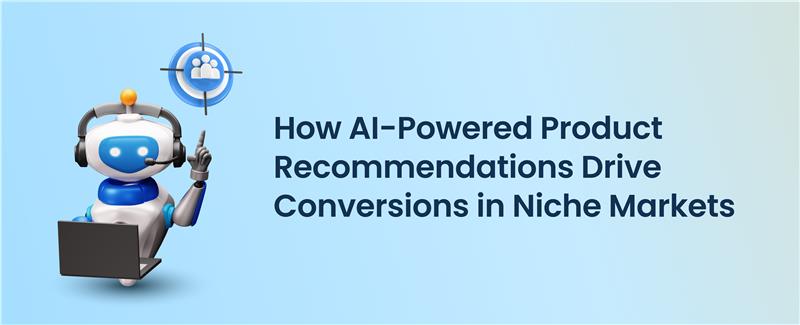
In niche markets, where customers have very specific likes and needs, being different takes more than just selling unique items. Companies must create shopping experiences that feel truly personal to win over their special group of buyers. Thanks to smart AI technology that suggests products, businesses can now do better than just guessing what customers might want – they can make suggestions that really hit the mark. These clever computer systems look at what each shopper likes and has bought before. This helps transform the whole shopping experience by matching what customers are looking for with exactly what the business has to offer. When done right, this leads to more sales and keeps customers coming back again and again.
Understanding Niche Markets
Niche markets cater to a specific segment of consumers with specialized needs or interests. These could range from eco-friendly beauty products to rare collectibles, vintage vinyl records to artisanal pet supplies. Unlike mass markets, niche markets have:
- A smaller audience base with distinct preferences and buying patterns.
- Higher customer expectations for personalization and expert knowledge.
- Limited room for error due to lower volume sales and specialized inventory.
- Unique challenges in customer acquisition and retention.
Understanding these dynamics is critical to crafting effective marketing strategies. AI technologies, particularly recommendation systems, can be a game-changer in addressing these challenges while maximizing market potential.
What Are AI-Powered Product Recommendations?
AI-powered product recommendations use sophisticated algorithms and machine learning to analyze customer behavior, preferences, and purchase history. These systems predict what a customer might want next, offering suggestions that feel tailored and relevant. For example:
- Collaborative Filtering: Suggests products based on the actions of similar users, creating a community-driven recommendation approach.
- Content-Based Filtering: Recommends items similar to those the customer has already viewed or purchased, ensuring consistency in taste and preference.
- Hybrid Models: Combine multiple approaches for more accurate recommendations, leveraging the strengths of various algorithms.
These systems transform static e-commerce catalogs into dynamic, interactive shopping experiences that evolve with each customer interaction.
The Role of AI in Niche Markets
1. Enhanced Personalization
In niche markets, customers often seek unique products that align closely with their preferences. AI can:
- Identify subtle patterns in user behavior across multiple shopping sessions.
- Tailor product recommendations to individual needs and browsing history.
- Offer personalized landing pages showcasing relevant items based on past interactions.
- Adjust recommendations in real-time based on current browsing behavior.
2. Improved Customer Retention
Repeat customers are vital for niche markets. AI-powered recommendations create a seamless shopping experience, increasing the likelihood of repeat purchases. Features like “frequently bought together” or “recommended for you” can:
- Encourage larger basket sizes through strategic product pairing.
- Build customer trust through consistently relevant suggestions.
- Create a more engaging and personalized shopping journey.
Also read 13 Effective Proven Customer Retention Strategies For eCommerce Stores Like Shopify
3. Scalability of Marketing Efforts
For small businesses, scaling operations while maintaining a personal touch can be difficult. AI helps automate personalized interactions, enabling businesses to:
- Reach more customers with tailored messages and product suggestions.
- Reduce manual workload while maintaining personalization.
- Scale customer service through intelligent recommendation systems.
Data-Driven Insights for Better Decisions
AI doesn’t just recommend products; it also provides actionable insights for businesses:
- Understanding Trends: By analyzing customer data, businesses can identify emerging trends within their niche and adjust inventory accordingly.
- Inventory Management: AI can forecast demand with greater accuracy, helping businesses stock the right products at the right time.
- Customer Segmentation: Grouping customers based on preferences and behaviors allows for more targeted and effective marketing campaigns.
Also read the Impact of E-commerce on Business: Opportunities & Challenges
Real-World Applications
Case Study 1: Boutique Skincare Brand
A luxury boutique skincare brand specializing in organic and natural ingredients leveraged AI technology to revolutionize their customer experience. By implementing advanced machine learning algorithms, the brand analyzed thousands of customer reviews, detailed browsing patterns, and purchase histories to create a sophisticated recommendation engine. The system examined factors like skin type, concerns, allergies, and environmental conditions to develop highly personalized skincare routines. This data-driven approach resulted in an impressive 40% increase in conversion rates, demonstrating the power of AI in understanding and meeting individual skincare needs.
Case Study 2: Specialized Sporting Goods
A premier online retailer focusing on high-performance running equipment transformed their customer experience through AI-powered shoe recommendations. The sophisticated system analyzed multiple data points including running style, preferred terrain, training intensity, and foot mechanics. By incorporating feedback from professional athletes and sports scientists, the AI engine could match runners with their ideal footwear. This innovative approach not only elevated customer satisfaction levels but also significantly reduced return rates, creating a more sustainable business model.
Challenges and Solutions
1. Limited Data Availability
One of the primary challenges in niche markets is the constraint of limited data sets. However, AI systems have developed innovative solutions to address this limitation:
- Leveraging pre-trained models from larger datasets while maintaining relevance to specific niches
- Implementing sophisticated transfer learning techniques to adapt existing AI models to specialized market requirements
- Combining small but highly relevant datasets with broader market insights for more accurate predictions
2. Balancing Automation with Human Touch
While AI automation offers numerous benefits, maintaining authentic customer connections remains crucial. Successful businesses achieve this balance through:
- Strategic integration of AI-driven recommendations with expert-curated selections
- Implementation of comprehensive customer feedback systems to continuously refine algorithmic accuracy
- Regular human oversight of AI recommendations to ensure alignment with brand values
Measuring Success
To effectively evaluate AI-powered recommendation systems, businesses should focus on key metrics:
- Conversion Rates: Track and analyze the percentage of users who complete purchases based on AI recommendations, measuring the direct impact on sales
- Average Order Value (AOV): Monitor changes in purchase amounts to determine if personalized recommendations encourage larger transactions
- Customer Lifetime Value (CLV): Evaluate the long-term impact of AI personalization on customer retention and recurring revenue
Future Trends
The landscape of AI-powered recommendations continues to evolve rapidly. Emerging trends include:
- Voice-Activated Shopping: Integration with smart assistants for intuitive, hands-free shopping experiences
- Augmented Reality (AR): Enhanced visualization capabilities allowing customers to experience products in real-world contexts
- Predictive Analytics: Advanced algorithms anticipating customer needs and preferences before they’re expressed
Read 13 E-Commerce Challenges and How To Overcome
On A Final Note
AI-powered product recommendations have fundamentally transformed customer interactions in niche markets. Through sophisticated personalization and data-driven insights, businesses can create more engaging shopping experiences while driving significant improvements in conversion rates. As technology continues to advance, the strategic implementation of AI will become increasingly crucial for maintaining competitive advantage in specialized industries. For more insights and tools to harness AI for your niche market we can help you with our expertise

